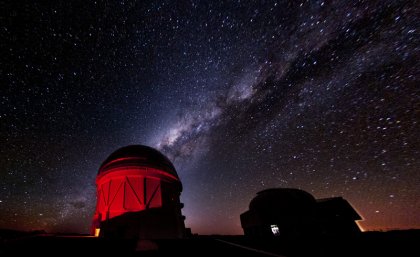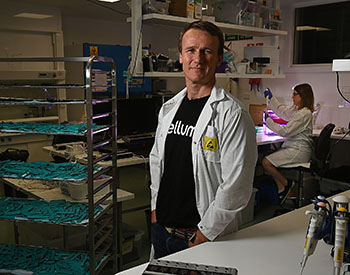Uncategorized
Truly astronomical: over half a billion celestial objects mapped
More than 690 million celestial objects have been catalogued, photographed and are now available online for exploration by the public, thanks to an international research collaboration. In a collaboration including The University of Queensland, The Australian National University and researchers from around Australia, the Dark Energy Survey (DES) has released its second set of data,…
Read MoreTesting times call for at-home testing measures
Meet the UQ graduate behind the first COVID-19 home diagnostic tool Dr Sean Parsons saw firsthand the huge impact of a pandemic when he was only a few years out of UQ and working as a young doctor in the emergency department of Caboolture Hospital. What he saw on the frontline in 2009 was a…
Read MorePhysicists create time reversed optical waves
Optics researchers from The University of Queensland and Nokia Bell Labs in the US have developed a new technique to demonstrate the time reversal of optical waves, which could transform the fields of advanced biomedical imaging and telecommunications. Time reversal of waves in physics doesn’t mean travelling back to the future; it describes a special type of wave which…
Read MoreUpdate on UQ COVID-19 vaccine
The University of Queensland and CSL today announce that the Phase 1 trial of the UQ-CSL v451 COVID-19 vaccine has shown that it elicits a robust response towards the virus and has a strong safety profile. There were no serious adverse events or safety concerns reported in the 216 trial participants. However, following consultation with the…
Read MoreWorld-first skin cancer treatment aims to help transplant patients
A new medication which can be applied to the skin could help prevent organ transplant recipients from developing harmful skin cancers. The world-first treatment being developed at The University of Queensland is the only drug of its type that could prevent the incidence of skin cancers for transplant patients. Lead researcher from UQ’s Diamantina Institute Associate Professor James Wells said…
Read MoreQueensland-made proteins and sophisticated antibody test for COVID-19 detection
Locally made coronavirus proteins produced in a state-of-the-art laboratory in Brisbane are proving highly useful in a sophisticated blood test for COVID-19. The University of Queensland’s Protein Expression Facility (PEF) partnered with the Public Health Virology team at Forensic and Scientific Services (FSS), Queensland Health to develop SARS-CoV-2 viral proteins These synthetic proteins can be used in…
Read More![TUQIA-col-rgb-315x70px[2] The University of Queensland in America](https://tuqia.org/wp-content/uploads/TUQIA-col-rgb-315x70px2.png)





